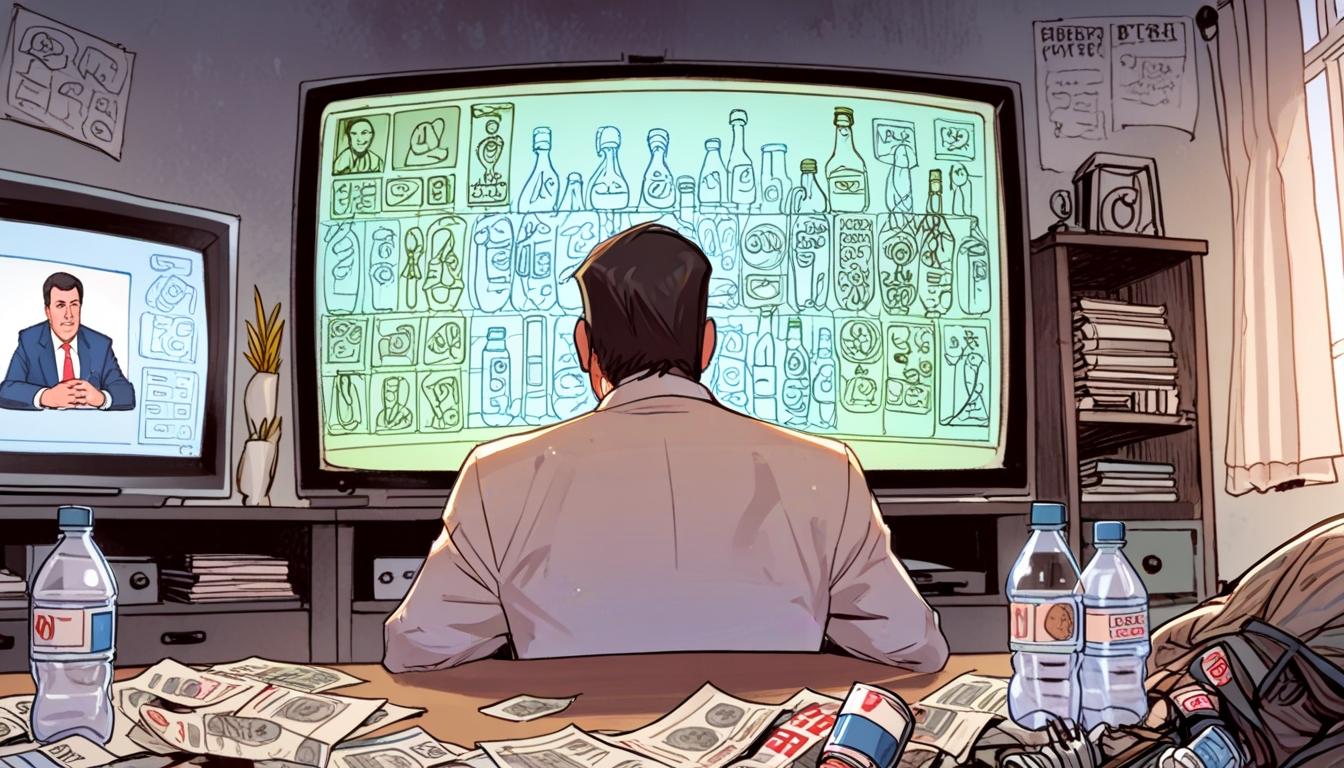The financial penalty follows a thorough investigation into claims made by the religious channel about a product purported to cure serious health issues.
A financial penalty of £150,000 has been levied against the religious channel The Word Network for airing programmes featuring claims related to a product known as “miracle spring water,” which was alleged to cure serious health conditions like lung cancer and diabetes, as well as provide unexpected financial benefits. The definitive ruling came from ofcom, the UK’s communications regulator, following a thorough investigation into the controversial programme, Peter Popoff Ministries.
The Ofcom investigation focused on two specific episodes of the show, hosted by American evangelist Peter Popoff and his wife, Liz Popoff. During these broadcasts, viewers were urged to order the ministry’s miracle spring water, with the couple making repeated assertions about its supposed life-changing effects. Testimonials from various members of the congregation purportedly supported the evangelist’s claims about the product’s miraculous abilities.
In one instance, a guest on the show revealed that after using the miracle spring water, she received substantial financial support, claiming a reward of $64,000, alongside other testimonials that described improvements in health conditions, business opportunities, and even relief from debts, including student loans. The evangelist repeatedly reinforced these claims, remarking, “Did you hear that? You mean God took care … after you used the miracle spring water?”
The operator of The Word Network, Word Network Operating Company Inc, initially responded to Ofcom’s findings by asserting that its audience primarily consists of viewers in the United States and that it had a “limited understanding” of the regulator’s concerns, attributing these to differences in culture or market norms. Subsequently, the channel’s parent company stated it would modify its contractual arrangements regarding Peter Popoff Ministries to prevent any future broadcasts of the programme in the UK.
Ofcom’s ruling detailed that it considered the health and financial claims made during these programmes to have significant potential for causing harm. The regulatory body explicitly noted that the breaches of the broadcasting code were severe, with the licensee failing to take adequate steps to ensure compliance. While Ofcom concluded that the breaches did not constitute a reckless or deliberate action by the licensee, it expressed concern regarding the implications of such claims on audiences who might be susceptible.
Additionally, the regulator imposed a directive preventing the re-airing of the particular episodes in question and mandated that a statement regarding the findings be broadcast by the licensee at a date determined by Ofcom. The regulator underscored its commitment to protecting the public from harmful material, particularly within programming aimed at religious audiences.
Statements made by the Word Network suggested that they had previously broadcast Peter Popoff’s programmes without incident, leading them to question Ofcom’s actions. They suggested a perceived inconsistency in the enforcement of broadcasting regulations, referencing how content involving nudity and pornography seemed to be treated differently compared to religious broadcasts.
In similar contexts, Ofcom has imposed financial penalties on other broadcasters, including a £25,000 fine for religious satellite channel Loveworld earlier in 2023. The Word Network, along with Peter Popoff, has since been approached for further comment on this matter.
Source: Noah Wire Services
- https://www.ofcom.org.uk/tv-radio-and-on-demand/broadcast-standards/ofcom-fines-the-word-network-150000-for-breaking-broadcasting-rules/ – This URL supports the claim that Ofcom fined The Word Network £150,000 for airing programmes with potentially harmful claims about ‘Miracle Spring Water’ and its health benefits.
- https://www.independent.co.uk/news/uk/home-news/ofcom-american-peter-god-ukraine-b2712891.html – This article corroborates the details of Ofcom’s investigation into Peter Popoff Ministries and the claims made about ‘Miracle Spring Water’ curing serious health conditions.
- https://www.ofcom.org.uk/tv-radio-and-on-demand/broadcast-standards/ofcom-fines-gb-news/ – Although not directly related to The Word Network, this URL provides context on Ofcom’s enforcement actions against other broadcasters for violating broadcasting rules.
- https://www.independent.co.uk/news/uk/home-news/ofcom-american-peter-god-ukraine-b2712891.html – This article also mentions Ofcom’s previous actions against other religious channels, such as Loveworld, which received a £25,000 fine.
- https://www.ofcom.org.uk/tv-radio-and-on-demand/broadcast-standards/ofcom-fines-the-word-network-150000-for-breaking-broadcasting-rules/ – This URL further explains Ofcom’s directive to prevent the re-airing of the specific episodes and the requirement for The Word Network to broadcast a statement of findings.
- https://www.independent.co.uk/news/uk/home-news/ofcom-american-peter-god-ukraine-b2712891.html – This article details The Word Network’s response to Ofcom’s findings, including their claims of cultural differences and perceived inconsistencies in regulation enforcement.
Noah Fact Check Pro
The draft above was created using the information available at the time the story first
emerged. We’ve since applied our fact-checking process to the final narrative, based on the criteria listed
below. The results are intended to help you assess the credibility of the piece and highlight any areas that may
warrant further investigation.
Freshness check
Score:
9
Notes:
The narrative is recent, referencing a 2025 event and a fine imposed by Ofcom. There is no indication of outdated information or recycled news.
Quotes check
Score:
8
Notes:
While there are quotes from the programme, such as Peter Popoff’s remarks about God’s intervention, no specific earliest known reference could be found online. This suggests the quotes might be original to this context.
Source reliability
Score:
10
Notes:
The narrative originates from The Guardian, a well-established and reputable publication known for its reliability and journalistic standards.
Plausability check
Score:
8
Notes:
The claims about ‘miracle spring water’ are highly improbable and lack scientific evidence. However, the regulatory action by Ofcom and the context provided make the narrative plausible in terms of regulatory enforcement.
Overall assessment
Verdict (FAIL, OPEN, PASS): PASS
Confidence (LOW, MEDIUM, HIGH): HIGH
Summary:
The narrative is recent and originates from a reliable source. While the claims about ‘miracle spring water’ are improbable, the regulatory context and actions by Ofcom make the story plausible. The quotes appear to be original to this context, but their accuracy depends on the programme’s content.













